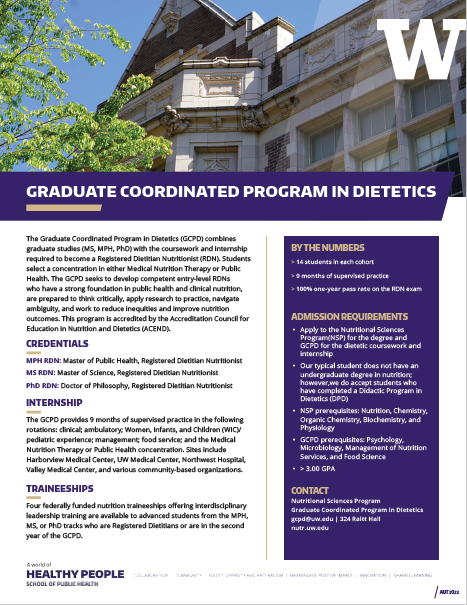Program Overview
Students in the Graduate Coordinated Program in Dietetics (GCPD) work simultaneously towards the completion of a graduate degree in nutritional sciences (MPH, MS or PhD) and the coursework & practice experiences necessary to become a registered dietitian nutritionist.
- Graduate level, 2-year, full-time program
- Completed with the MPH, MS or PhD curriculum
- Accredited by ACEND
- Apply by Dec 1
The GCPD curriculum is integrated into the first five quarters of the graduate degree curricula, followed by three quarters of the internship. For course requirements, review curriculum pages for the MS in Nutritional Sciences or MPH in Nutritional Sciences. Students accepted into the GCPD, along with the degree program, have a high credit load, leaving little time for additional electives. The timing of the PhD curriculum and internship requirements will be coordinated on a case by case basis to accommodate their dissertation research projects.
The GCPD offers two concentration areas: Medical Nutrition Therapy (MNT) and Public Health (PH). MS students usually select the MNT concentration, and MPH students complete the PH concentration. PhD students select the concentration that best supports their career goals. MPH-Nutrition students may use the PH concentration as their practicum to meet the School of Public Health degree requirements. Interns work closely with GCPD faculty to select their concentration rotation. Other rotations are assigned.
Learn more about rotations in practice experience.
- Coursework & Internship – Students complete 4 quarters of coursework for both the graduate program and the GCPD. Students complete 3 quarters of supervised practice January – August of year 2. As an ACEND-accredited program, the GCPD provides 8 months of supervised practice in the following rotations: clinical, ambulatory, WIC/pediatric, management, food service, and MNT or PH concentration.
- Thesis/Capstone/Dissertation – While students may be able to graduate after completing the Practice Experience, it is common for a student to take an additional quarter to finish their thesis/capstone. PhD students may require additional time but will be active in the GCPD for only 2 years.
Students in the GCPD are subject to the policies of the School of Public Health and Food Systems, Nutrition, and Health Program, specifically the policy on immunizations, health insurance and safety training. All students are also subject to a national background check. Students are required to maintain liability insurance. Students not compliant with immunization or background check requirements will not be allowed to complete practice experience rotations. Practice experience sites have their own set of requirements including background checks, orientation, and drug tests.
Students must apply to the Food Systems, Nutrition, and Health Program for the degree (MS or MPH) and the GCPD for the RDN training program. PhD applicants can apply to the GCPD once enrolled in the program. Acceptance into the GCPD is conditional on acceptance to the Food Systems, Nutrition, and Health Program. The GCPD admits 14 students into the program each fall.
To apply: Review eligibility requirements, including specific prerequisites. The GCPD does not participate in DICAS.
- All GCPD offers of admission are contingent on passing a national background check at the applicant’s expense ($50-100).
- While we accept students with undergraduate degrees in nutrition who have also completed dietetic coursework from an accredited Didactic Program in Dietetics (DPD), and have a DPD verification form, our average student does not have this background. Students with a DPD verification form do not waive out of GCPD course work. All students participating in the GCPD complete a degree (MS, MPH, PhD), the dietetic coursework and the supervised practice necessary to sit for the RDN exam after graduating.
Accreditation
The GCPD at the University of Washington is accredited by the Accreditation Council for Education in Nutrition and Dietetics by the Academy of Nutrition and Dietetics, 120 Riverside Plaza, Suite 2190, Chicago, IL 60606-6995, 1-800-877-1600, ext. 5400.
Website: http://www.eatrightpro.org/resources/acend
Graduation and Issuance of the Verification Form
Upon successful completion of all requirements of the GCPD, including degree requirements, the student will receive a verification form as required by the Accreditation Council for Education in Nutrition and Dietetics.
Graduates sit for the Registered Dietitian (RD/RDN) examination after graduation. Washington State does not currently offer licensure to Registered Dietitians but they do offer Certification for Dietitian/Nutritionists.
The program has a 100% 1-year pass rate on the RD/RDN examination.
Anne Lund, MPH, RDN, FAND
Director, Graduate Coordinated Program in Dietetics
MPH Program Director
Food Systems, Nutrition, and Health Program
School of Public Health
University of Washington
Michelle Averill, PhD, RDN
Associate Director, Graduate Coordinated Program in Dietetics
Associate Teaching Professor, Environmental and Occupational Health Sciences
School of Public Health
University of Washington
Lacey Henderson
Student Services Coordinator, Graduate Coordinated Program in Dietetics
Food Systems, Nutrition, and Health Program
School of Public Health
University of Washington
Graduate Coordinated Program in Dietetics
324 Raitt Hall, Box 353410
Seattle, WA 98195-3410
Email: gcpd@uw.edu
Accreditation
The GCPD at the University of Washington is accredited by the Accreditation Council for Education in Nutrition and Dietetics by the Academy of Nutrition and Dietetics, 120 Riverside Plaza, Suite 2190, Chicago, IL 60606-6995, 1-800-877-1600, ext. 5400.
Website: http://www.eatrightpro.org/resources/acend
ACEND Requirements
Effective January 1, 2024, the Commission on Dietetic Registration (CDR) will require a minimum of a master’s degree to be eligible to take the credentialing exam to become a registered dietitian nutritionist (RDN). In order to be approved for registration examination eligibility with a bachelor’s degree, an individual must meet all eligibility requirements and be submitted into CDR’s Registration Eligibility Processing System (REPS) before 12:00 midnight Central Time, December 31, 2023. For more information about this requirement visit CDR’s website. In addition, CDR requires that individuals complete coursework and supervised practice in program(s) accredited by the Accreditation Council for Education in Nutrition and Dietetics (ACEND). Graduates who successfully complete the ACEND-accredited [program type] program at [Institution name] are eligible to [apply to an ACEND-accredited supervised practice program/apply to take the CDR credentialing exam to become an RDN]. In most states, graduates also must obtain licensure or certification to practice. For more information about state licensure requirements click here.



